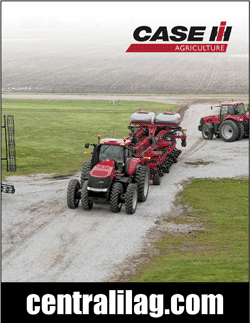|
According to the NWS:
-
The first eight months of 2012 were the hottest ever
recorded in the continental United States.
-
The summer period of June through August was the
third-hottest ever, and July 2012 was the hottest ever
recorded since record keeping began in 1895.
-
From June 1 until the end of August, rainfall was almost
10 inches less than in a typical year; and from the first of
the year, the deficit was over 13 inches.
-
The drought map of Illinois showed central Illinois
almost always in the severe drought category.
The farming community in Illinois is just finishing the harvest
of field corn and soybeans, and yields are down significantly from
previous years.
But, those we think of as traditional farmers, with their
GPS-guided tractors and huge combines tilling thousands of acres,
are only one part of the farming profession affected by this year's
extreme weather.

Hundreds of farmers in Illinois have small acreage on which they
grow fruits, vegetables, herbs and even cut flowers for the table.
Many of these farmers outlet their wares at farmers markets,
roadside stands and through community-supported agriculture
programs.
There are two farmers markets in Lincoln. The one in Scully Park
operates on Wednesdays and Saturdays from May through October.
Bryan Crump participates in the Lincoln market, as well as others
in central and northern Illinois. He sells a multitude of vegetables
from his farm near Carlock.
Irrigation was not an option for him, and the lack of water made
his vegetables smaller.
"My yields are down for the year, with the heat taking the worst
toll," Crump said.
However, due to a late-season rain, his harvest of squash and
onions was better than expected.
Ken Wilson of Waynesville began selling his produce at the
farmers market for the first time. He said that his entire sweet
corn crop had to be plowed under. His tomatoes and peppers were the
best crops of the year for him. With a smile, he said he will be
back next year.
Megan Boerma of Lincoln has worked out a sweet deal for her
garden. She gets water for her garden from a neighbor in exchange
for homemade bakery items, which she also sells at the farmers
market.

"Because of the nearby water, it turned out that the bunnies and
bugs did the most damage to my veggies," she said.
A typical Friday for Boerma lasts into the wee hours of Saturday
morning, when you will find her in her kitchen. This is to ensure
that her bakery items are as fresh as possible for the Saturday
market.
Susan Wachter of Wachter Farms, a 5-acre produce farm near
Lawndale, had much the same story to tell.
"I mowed down 14 batches of sweet corn, probably thousands of
ears, because the heat sterilized the pollen that is used to produce
the kernels," she said.
Wachter participates in the Lincoln Farmer's Market as well as
the Illinois Products Farmers' Market at the Illinois State
Fairgrounds on Thursdays.
Her green beans were way down, a result similar to the
experiences of others in the area surrounding Lincoln.

[to top of second column] |
 She does try a different technique, covering her entire plot with
a biodegradable black plastic covering through which the vegetables
grow. The result is that whatever moisture is in the ground stays
there, and the small amount of rain was funneled through the plastic
right to the root system of the plants.
Wachter's experiences were interesting this year. Her revenue was
down for the year, and the production that did occur was unique.
Vegetables grew faster, which led to some of the produce misshapen
from lying on the ground, and vegetables that have some sugar in
them were much sweeter.
The sweeter vegetables are similar to reports from peach growers
in southern Illinois and grape growers around the state. Peaches
were extra sweet this year, and vintners are looking forward to a
special year for their wine.
"My winter squash is hardy, and the rain from the hurricane saved
my tomatoes," Wachter added.
Hans Bishop, in his third year of growing organic vegetables on
10 acres at PrairiErth Farm, east of Atlanta, worked harder than
ever to get a crop ready for the Bloomington and Urbana farmers
markets. He also has a growing client list for his
community-supported agriculture program.
In a CSA program, a farmer presells his crop of fruits and
vegetables to customers who agree to buy a specified amount during
the growing season.

"My early crops were good -- those from late winter, early
spring," Bishop said. They included squash, lettuce, radishes,
carrots, beets and turnips.
Then, as the heat ramped up, the crops began to suffer.
Once a crop is harvested, that field is not used again until the
next season. Bishop plants cover crops on the recently harvested
plots so the soil is replenished. But the lack of rain and intense
summer heat damaged the cover crop.
Bishop said the heat was the main issue this year because it
caused sporadic germination of crops.
He did use a drip irrigation system to try to mitigate the
drought conditions, but it is not a perfect solution. The hoses in
the irrigation system have to be moved continually to cover all of
the crops that need water, and the small holes in the hoses that let
water trickle out tend to get plugged, requiring additional
attention to keep the system working. Also, the irrigation system
uses electricity to pump water from the well, creating an additional
expense.
Still, Bishop is upbeat about the season, recognizing that this
is an unusual year. His hard work, adaptive methods of growing
produce and the late-season rain saved his crop.

PrairiErth CSA customers always received their orders and were
understanding when he explained the trials of farming caused by the
2012 drought and heat and the impact on his crops.
When we visit the farmers markets and greet the smiling vendors
behind tables loaded with beautiful and seemingly bountiful produce,
it is important to remember that long hours and strenuous work in
the fields were necessary. This year's unusual weather produced the
additional burden of anxiety for farmers whose livelihood depends to
a great extent of the vagaries of Mother Nature.
[By
CURT FOX]Be sure to check out all the articles
in the
Farm
Outlook Fall 2012 magazine:
-
2012 in
review
-
Yields: Complicated by aflatoxin
-
Hybrids saved us
-
Insurance claims in drought
-
Impact of drought on ag loans
-
Droughts: 1988 vs. 2012
-
Roundup: A view from all sides
-
How were the
farmers markets affected?
-
Introduction: Troy Rawlings
-
An
optimistic outlook
|